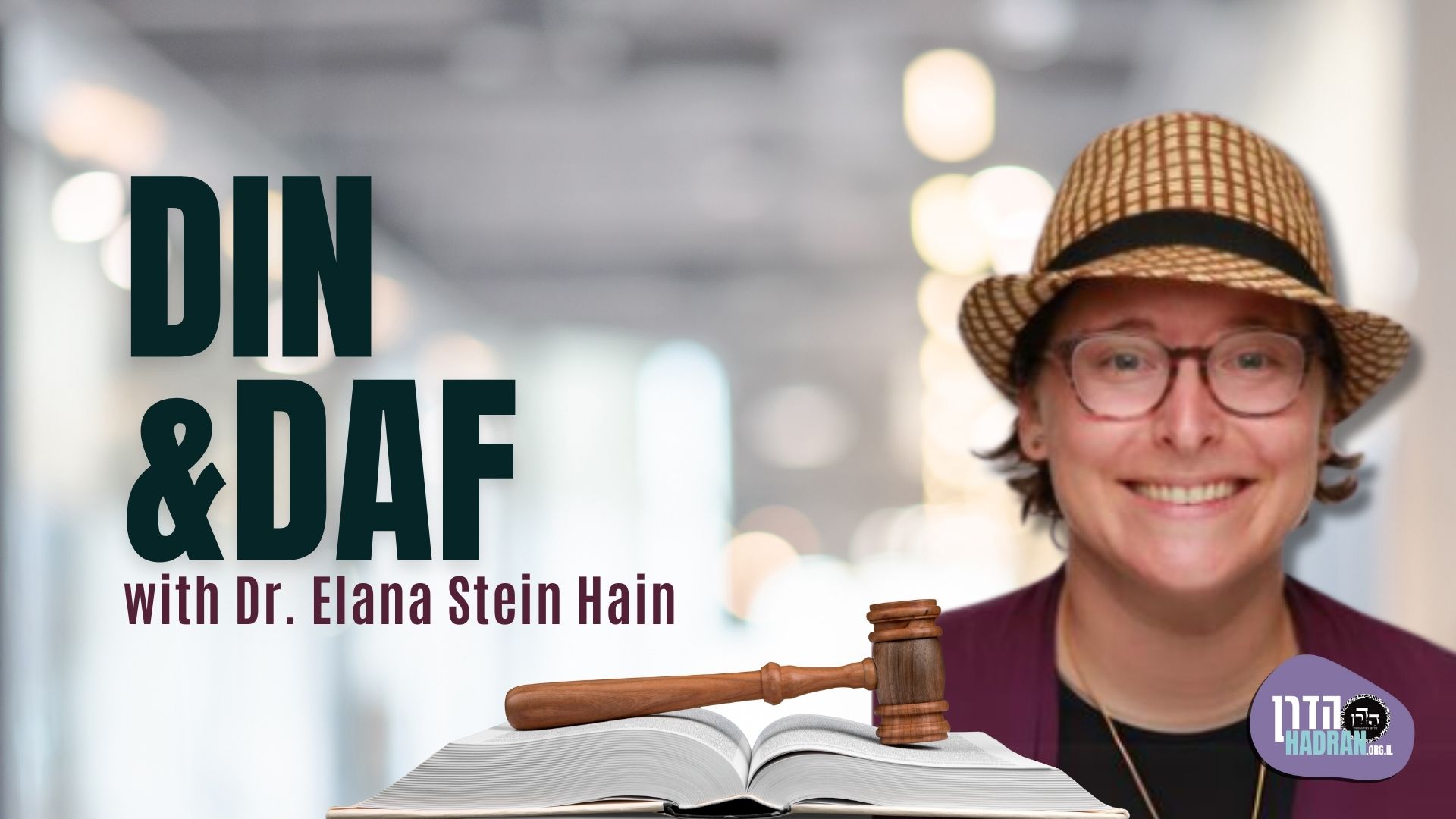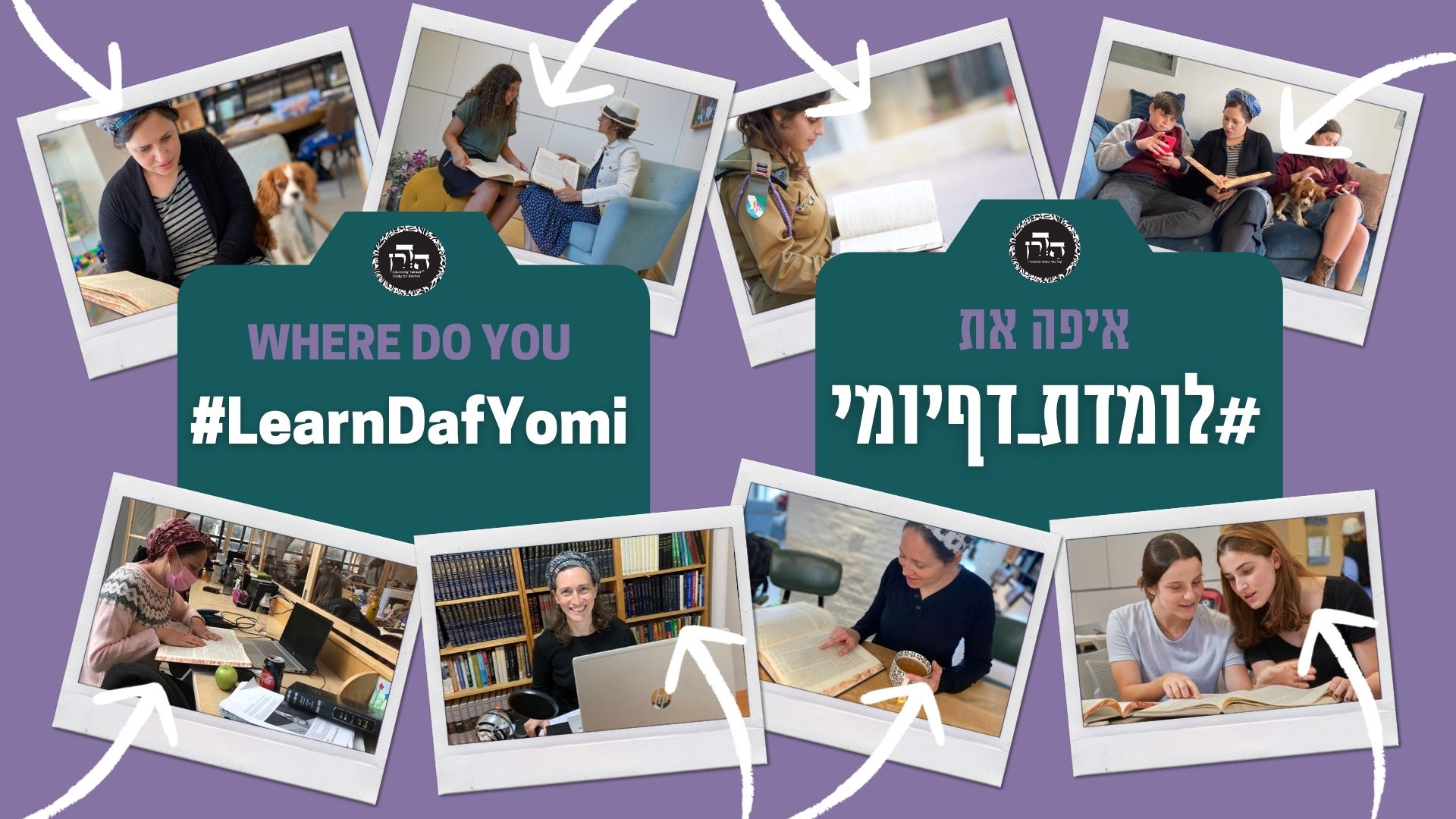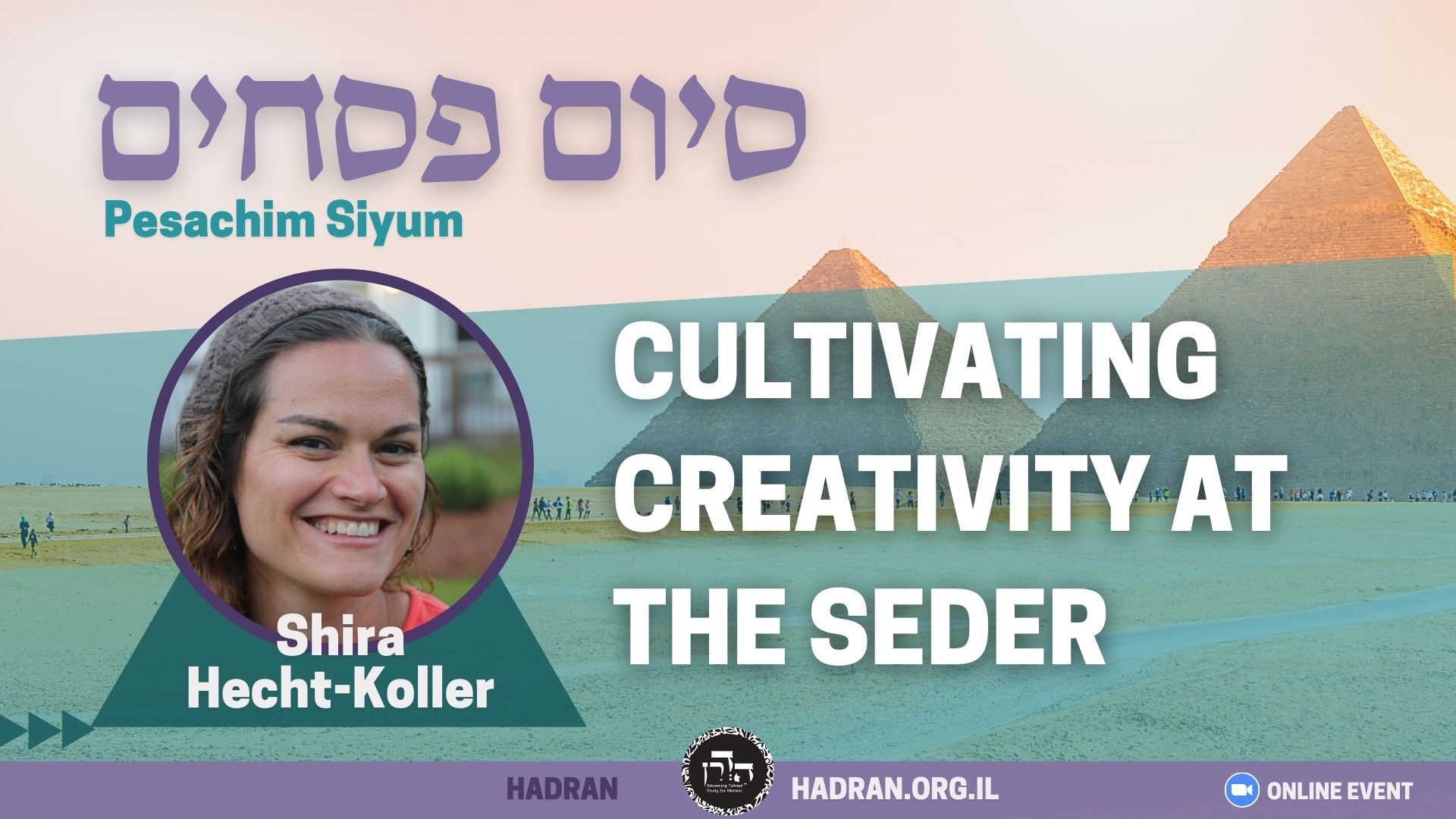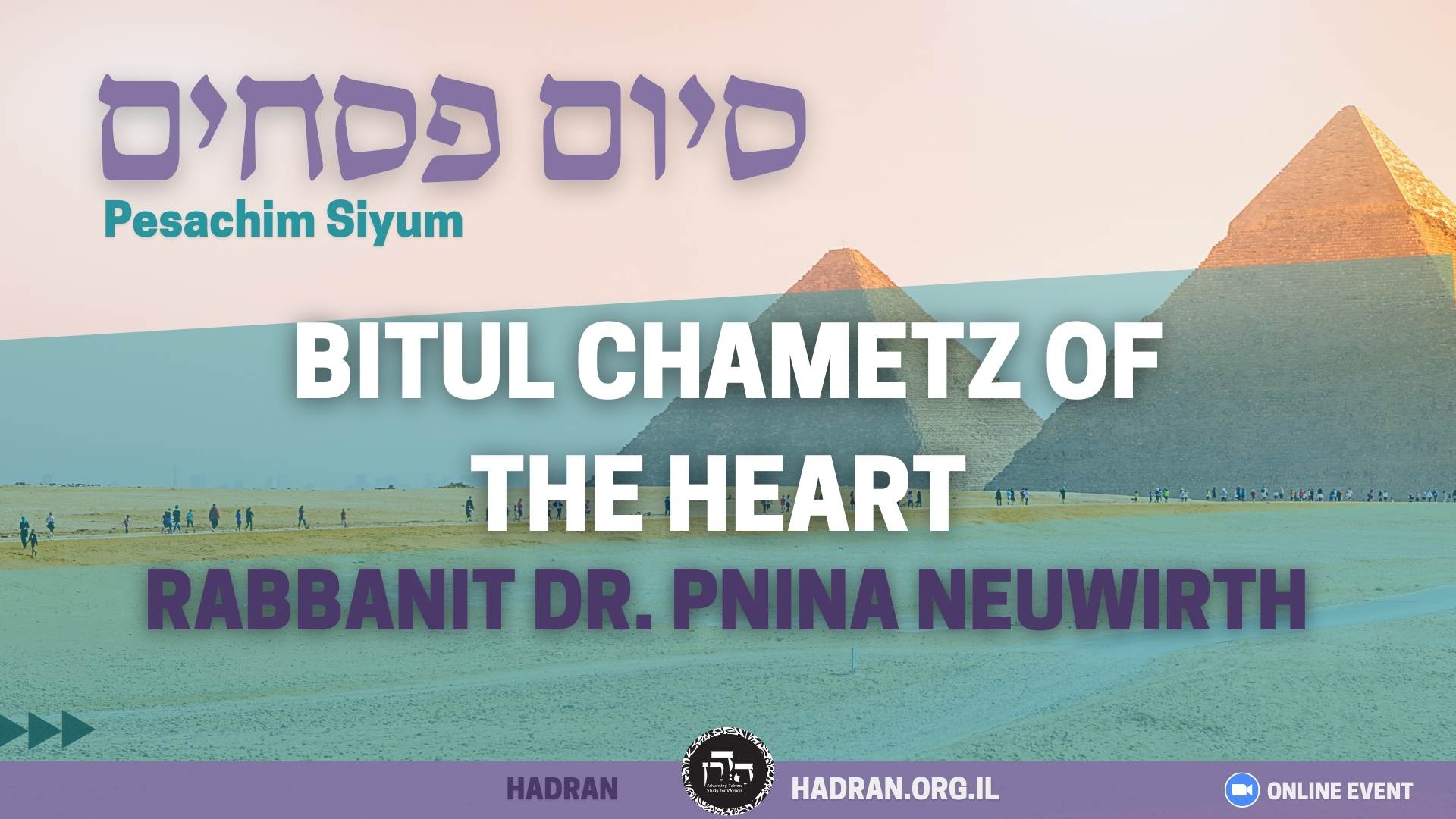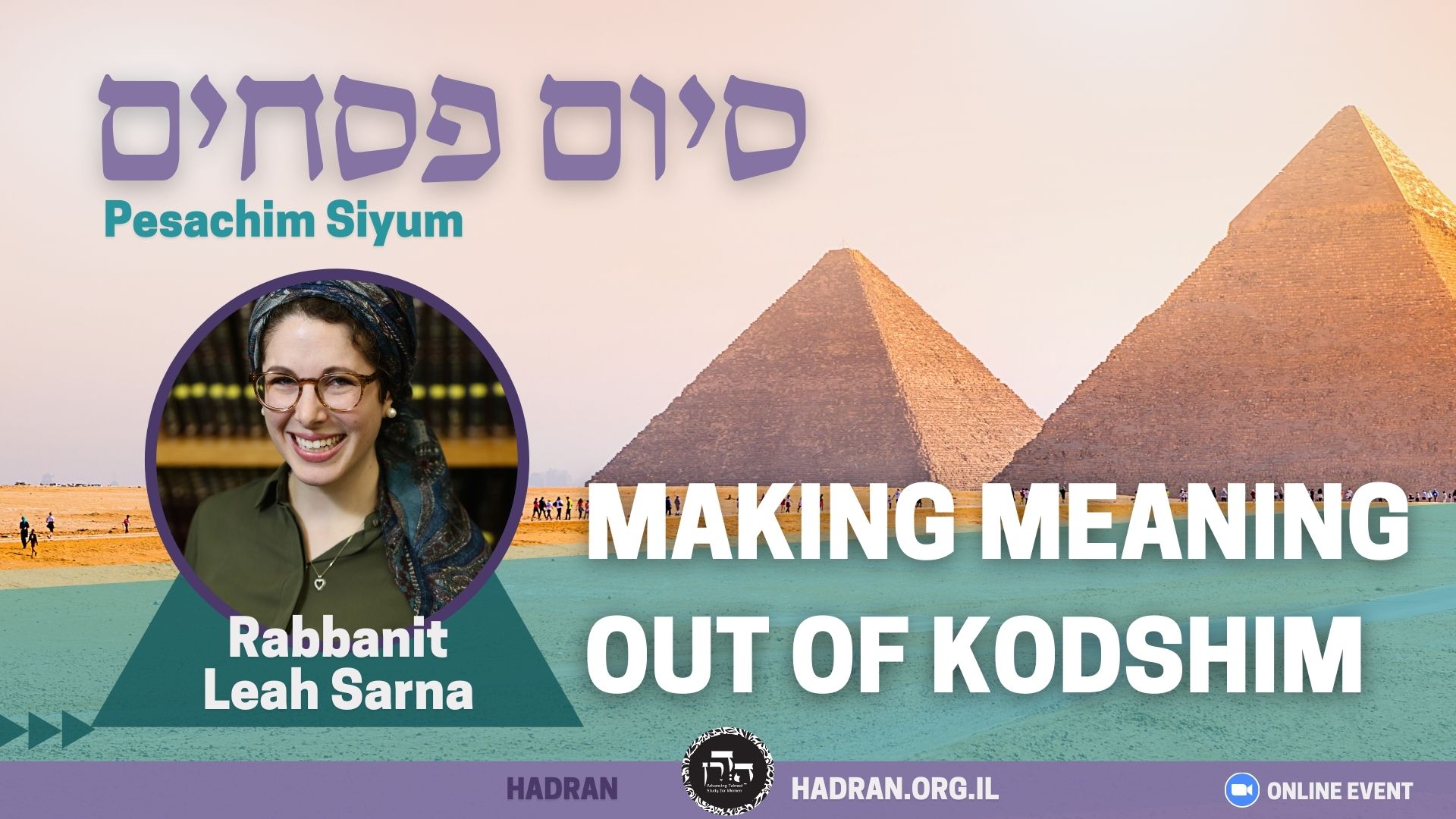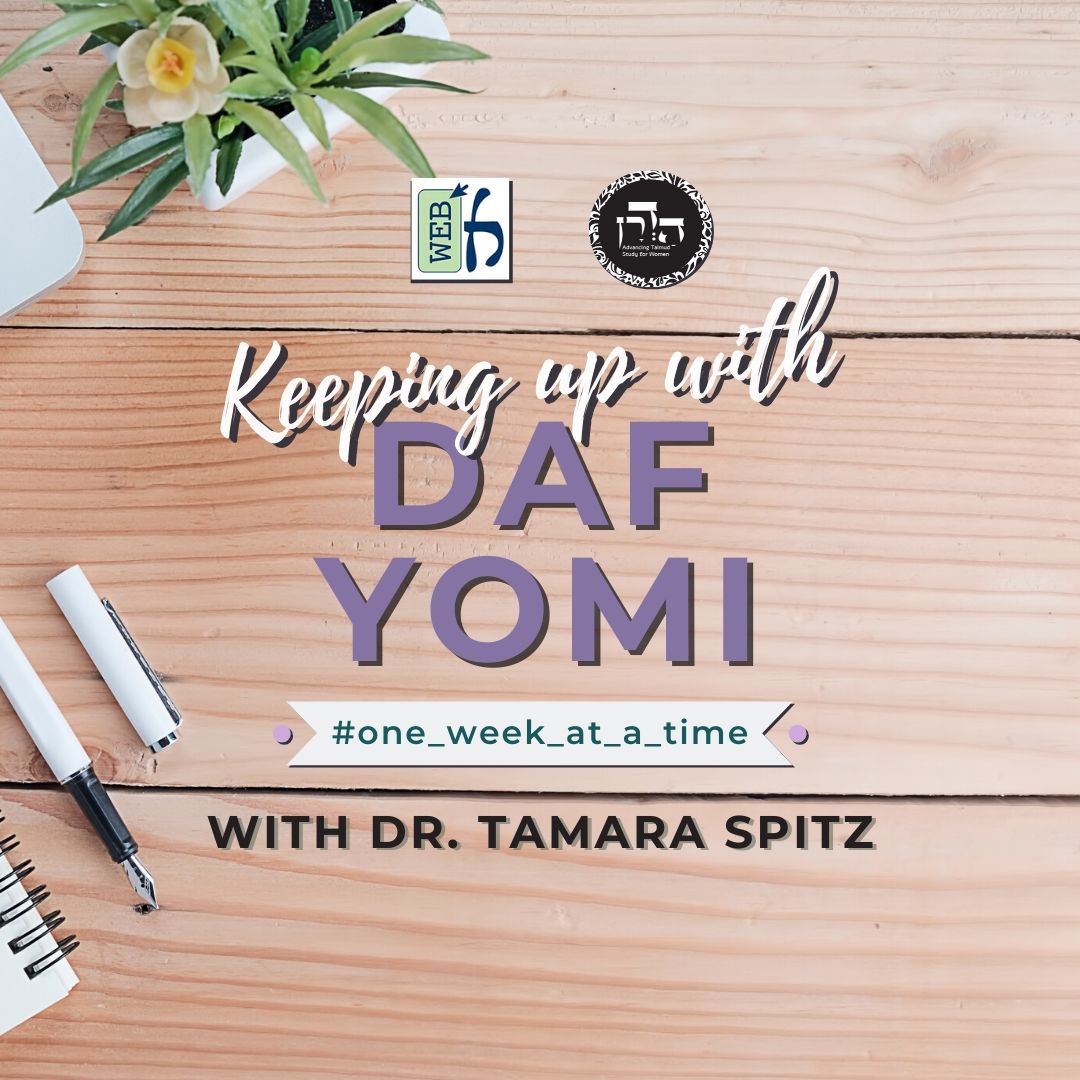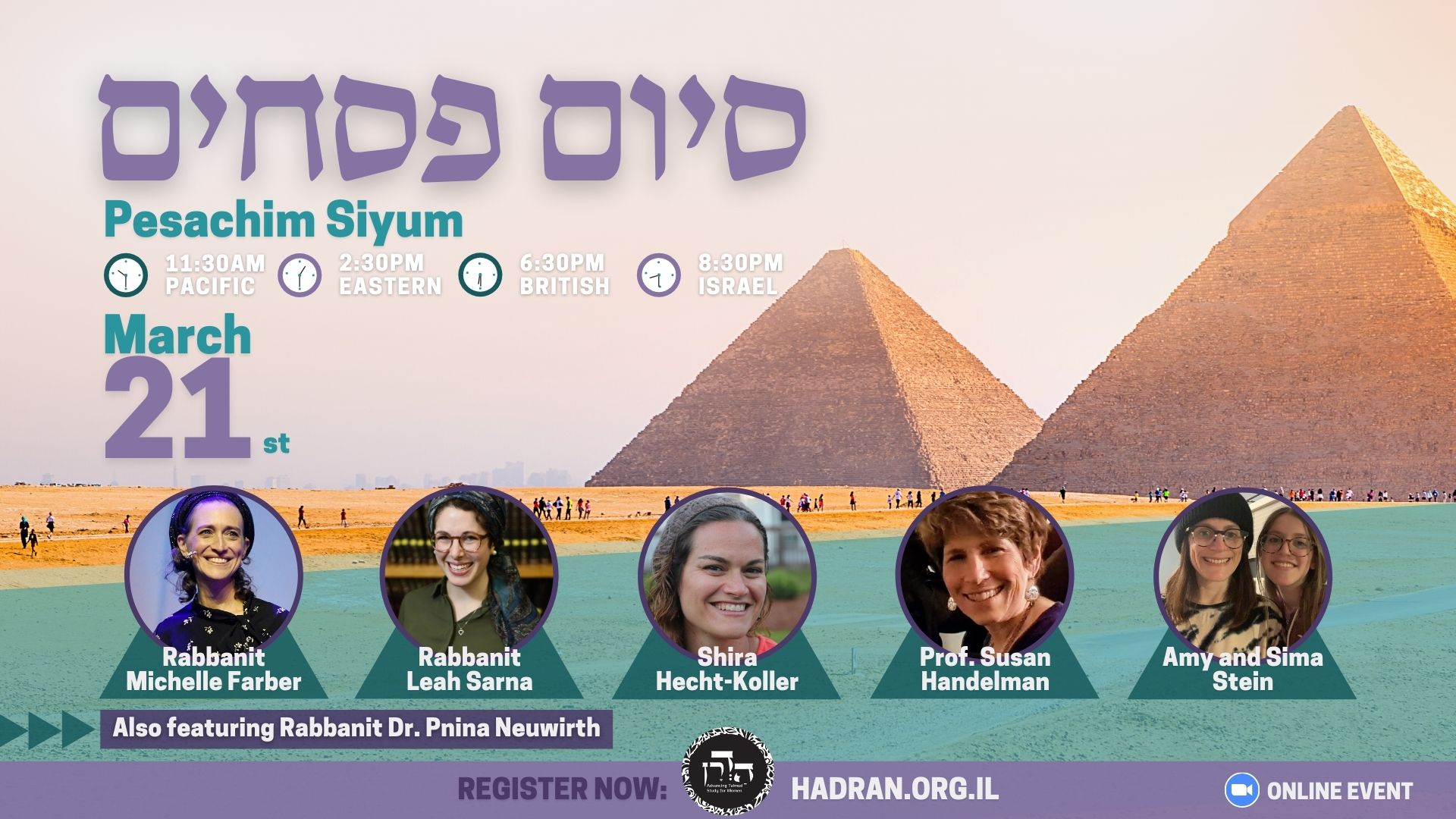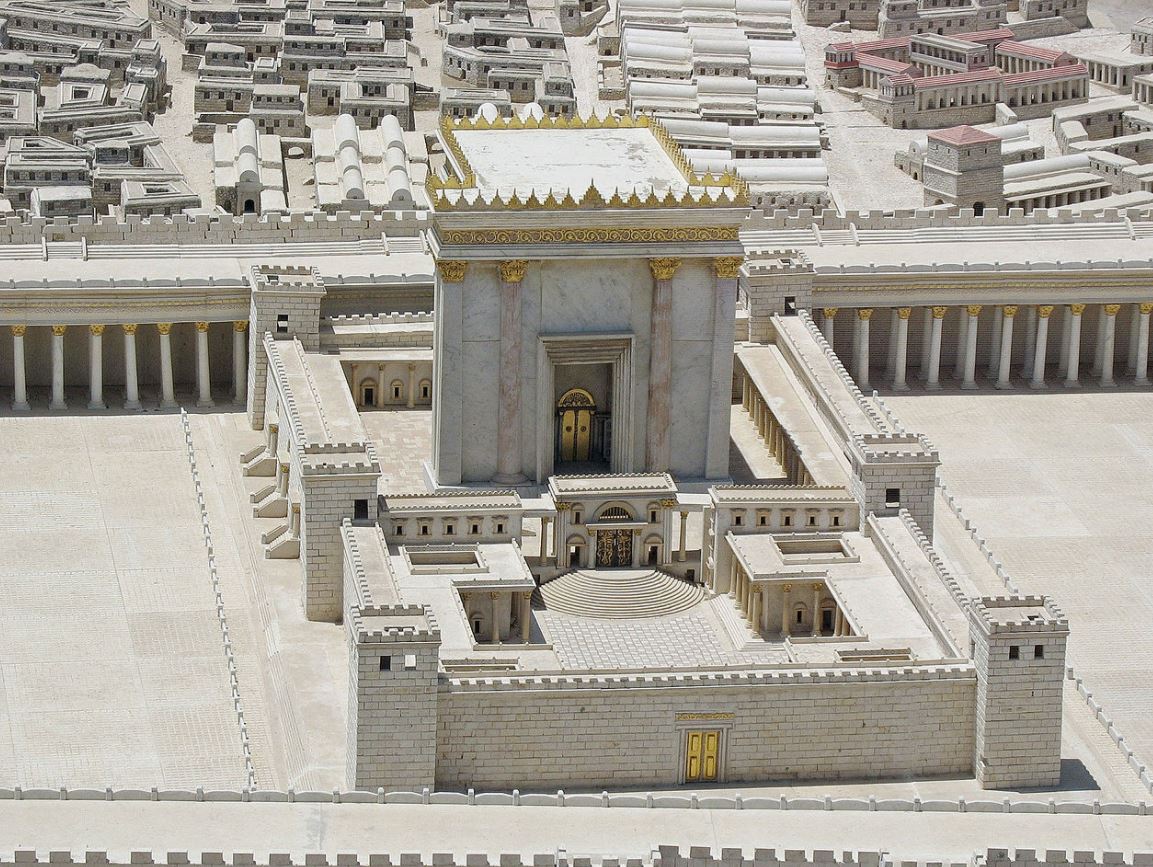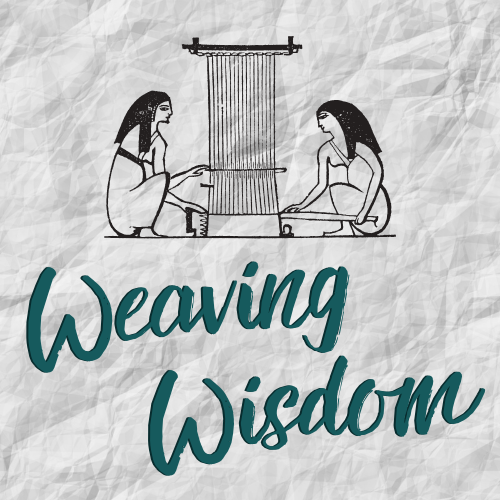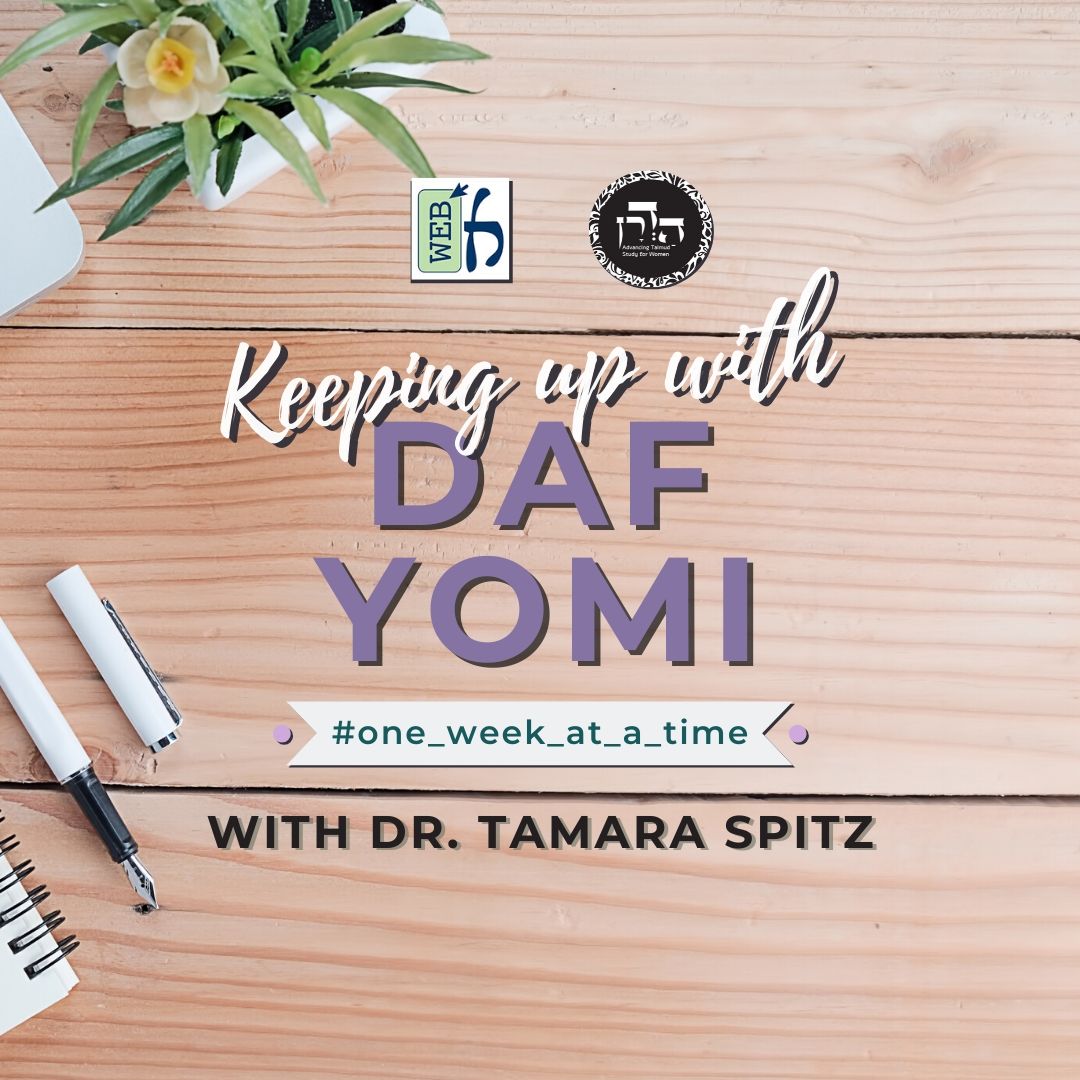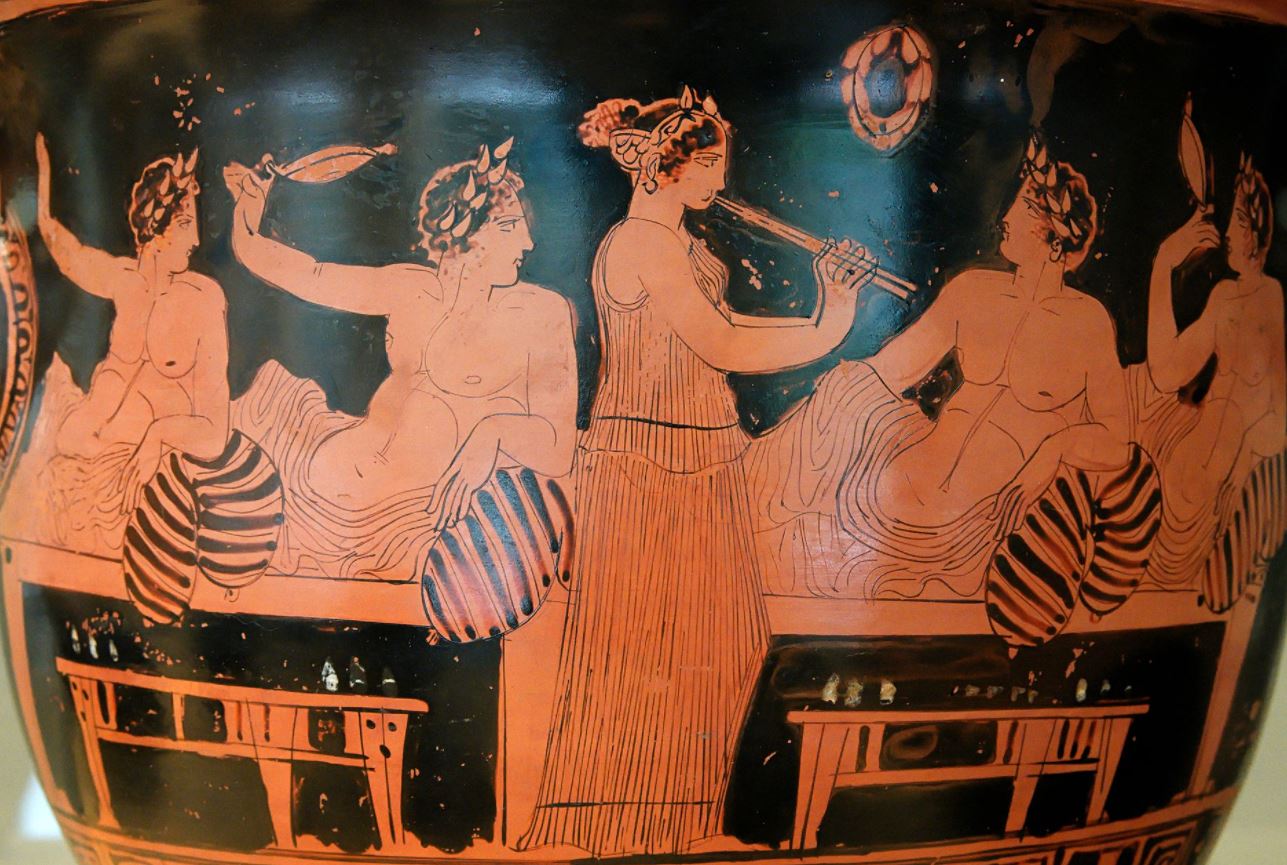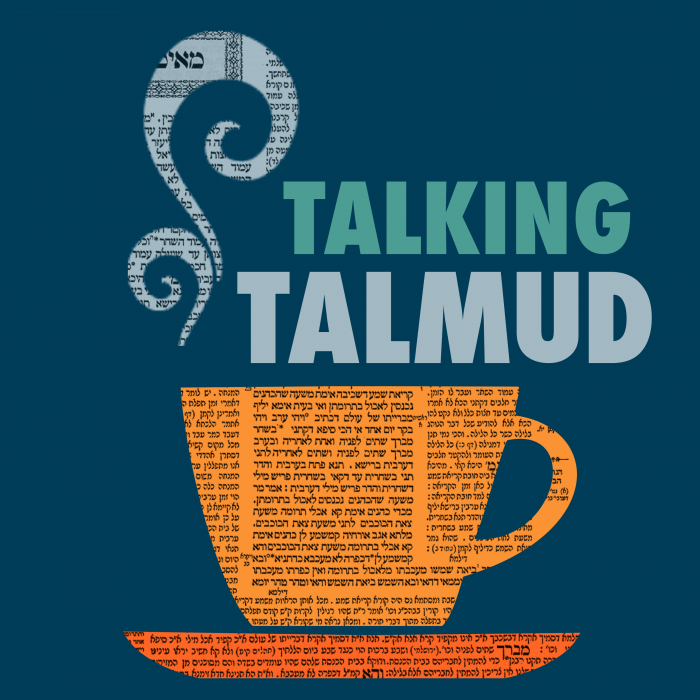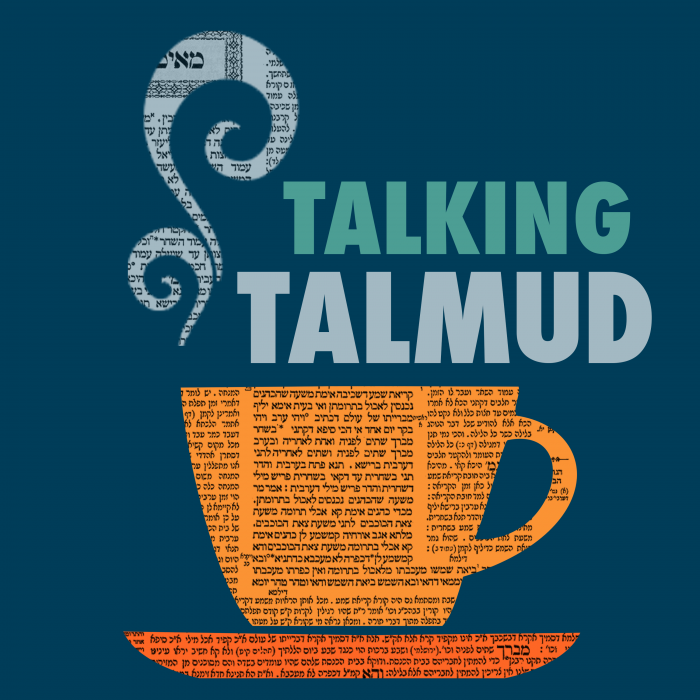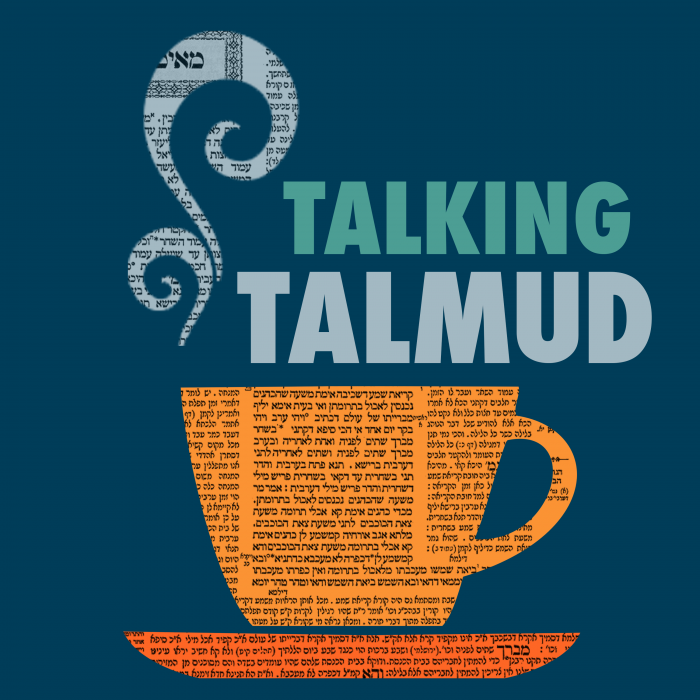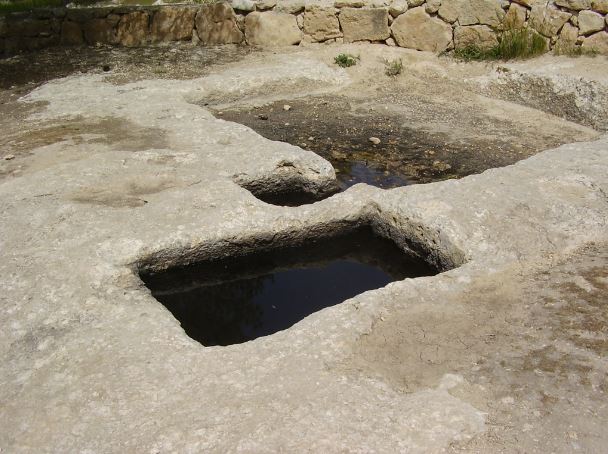If there is someone who is unsure whether something will prevent them from being able to eat the sacrifice at night, can they be included in the sacrificing of the animal? The mishna describes various cases like this. Can one slaughter a Pesach sacrifice for one individual? Who can make up a group for Pesach – what combinations of people are not permitted? Why? Are women obligated in Pesach or in Pesach Sheni? Is it obligatory, optional, not allowed? Three opinions are brought and the gemara explains where in the verses they derive their positions. Pesach, matza and marror are obligatory on the first night only. Women are obligated in matza and marror as men – why?
This week’s learning is sponsored for the merit and safety of Haymanut (Emuna) Kasau, who was 9 years old when she disappeared from her home in Tzfat two years ago, on the 16th of Adar, 5784 (February 25, 2024), and whose whereabouts remain unknown.
This week’s learning is dedicated of the safety of our nation, the soldiers and citizens of Israel, and for the liberation of the Iranian people. May we soon see the realization of “ליהודים היתה אורה ושמחה וששון ויקר”.
This week’s learning is sponsored for the merit and safety of Haymanut (Emuna) Kasau, who was 9 years old when she disappeared from her home in Tzfat two years ago, on the 16th of Adar, 5784 (February 25, 2024), and whose whereabouts remain unknown.
Want to dedicate learning? Get started here:


Today’s daily daf tools:
This week’s learning is sponsored for the merit and safety of Haymanut (Emuna) Kasau, who was 9 years old when she disappeared from her home in Tzfat two years ago, on the 16th of Adar, 5784 (February 25, 2024), and whose whereabouts remain unknown.
This week’s learning is dedicated of the safety of our nation, the soldiers and citizens of Israel, and for the liberation of the Iranian people. May we soon see the realization of “ליהודים היתה אורה ושמחה וששון ויקר”.
This week’s learning is sponsored for the merit and safety of Haymanut (Emuna) Kasau, who was 9 years old when she disappeared from her home in Tzfat two years ago, on the 16th of Adar, 5784 (February 25, 2024), and whose whereabouts remain unknown.
Today’s daily daf tools:
Delve Deeper
Broaden your understanding of the topics on this daf with classes and podcasts from top women Talmud scholars.
New to Talmud?
Check out our resources designed to help you navigate a page of Talmud – and study at the pace, level and style that fits you.
The Hadran Women’s Tapestry
Meet the diverse women learning Gemara at Hadran and hear their stories.
Pesachim 91
וְהַמְפַקֵּחַ אֶת הַגַּל, וְכֵן מִי שֶׁהִבְטִיחוּהוּ לְהוֹצִיאוֹ מִבֵּית הָאֲסוּרִים, וְהַחוֹלֶה וְהַזָּקֵן שֶׁהֵן יְכוֹלִין לֶאֱכוֹל כְּזַיִת — שׁוֹחֲטִין עֲלֵיהֶן.
and one clearing a pile of stones that collapsed on top of a person, in which case there is a possibility that the person buried underneath is dead and his corpse will impart ritual impurity to the person clearing the pile; and similarly, one whom the governing body promised to release from prison on the night of Passover; and an ill person and an elderly person who are still capable of eating an olive-bulk of meat, one slaughters the Paschal lamb on their behalf, since they are currently fit to eat the Paschal lamb.
עַל כּוּלָּם אֵין שׁוֹחֲטִין עֲלֵיהֶן בִּפְנֵי עַצְמָן, שֶׁמָּא יָבִיאוּ אֶת הַפֶּסַח לִידֵי פְסוּל.
However, with regard to all of them, this is only true when they are included in a group with other people who will definitely be able to partake of the lamb; but we do not slaughter the Paschal lamb on their behalf if they are by themselves, either as individuals or in a group composed entirely of such people, because perhaps they will cause the Paschal lamb to become disqualified, since there is a possibility that by the night of Passover they will be unable to partake of the Paschal lamb.
לְפִיכָךְ אִם אֵירַע בָּהֶן פְּסוּל — פְּטוּרִין מִלַּעֲשׂוֹת פֶּסַח שֵׁנִי, חוּץ מִן הַמְפַקֵּחַ בַּגַּל, שֶׁהוּא טָמֵא מִתְּחִלָּתוֹ.
Therefore, since they were registered for a Paschal lamb and it was slaughtered when they were still fit to partake of it, even if a disqualification occurred to them later, preventing them from partaking of the Paschal lamb, they are nevertheless exempt from observing the second Pesaḥ. The exemption from the second Pesaḥ is dependent not on whether they partook of a Paschal lamb, but on whether it was validly slaughtered on their behalf. This holds true except for one who was clearing a pile of stones where the person buried underneath was eventually found dead, because in such a case the person searching for him certainly stood over the corpse at some point. He had therefore become ritually impure from the outset, even before the Paschal lamb was slaughtered. Consequently, he would not have been fit even during the slaughter and will have to observe the second Pesaḥ.
גְּמָ׳ אָמַר רַבָּה בַּר הוּנָא אָמַר רַבִּי יוֹחָנָן: לֹא שָׁנוּ אֶלָּא בֵּית הָאֲסוּרִין דְּגוֹי, אֲבָל בֵּית הָאֲסוּרִין דְּיִשְׂרָאֵל — שׁוֹחֲטִין בִּפְנֵי עַצְמוֹ, כֵּיוָן דְּאַבְטְחִינְהוּ, מַפֵּיק לֵיהּ, דִּכְתִיב: ״שְׁאֵרִית יִשְׂרָאֵל לֹא יַעֲשׂוּ עַוְלָה וְלֹא יְדַבְּרוּ כָזָב״.
GEMARA: The mishna teaches that the Paschal lamb may be slaughtered on behalf of a prisoner only if he is included in a group with other people. Rabba bar Huna said that Rabbi Yoḥanan said: They taught this only if he is in a prison belonging to gentiles; but if he is in a prison belonging to Jews, one slaughters on his behalf even if he is by himself and not included in a group with other people. Since they promised him they would release him they will certainly release him, as it is written: “The remnant of Israel will not do iniquity nor speak lies” (Zephaniah 3:13). Therefore, there is no concern that on the night of Passover he will not be able to partake of the Paschal lamb.
אָמַר רַב חִסְדָּא: הָא דְּאָמְרַתְּ בֵּית הָאֲסוּרִין דְּגוֹיִם, לָא אֲמַרַן אֶלָּא חוּץ לְחוֹמַת בֵּית פָּאגֵי. אֲבָל לִפְנִים מֵחוֹמַת בֵּית פָּאגֵי — שׁוֹחֲטִין עָלָיו בִּפְנֵי עַצְמוֹ. מַאי טַעְמָא — אֶפְשָׁר דְּאַמְטוּ לֵיהּ וְאָכֵיל לֵיהּ.
Rav Ḥisda said: With regard to that which you said, that the mishna’s ruling permitting the Paschal lamb to be slaughtered on behalf of a prisoner, but only when he is included in a group with others, refers to a prisoner in a prison belonging to gentiles, they said this only with regard to a prison outside the wall of Beit Pagei, i.e., the prison is located outside the area where the Paschal lamb may be consumed. But if the prison is located within the wall of Beit Pagei, one slaughters on his behalf even if he is by himself and not included in a group with other people. What is the reason? Even if he is not released from prison, it is possible for them to bring him a portion of the Paschal lamb while still in prison, and he will eat it there.
לְפִיכָךְ אִם אֵירַע וְכוּ׳. אָמַר רַבָּה בַּר בַּר חָנָה אָמַר רַבִּי יוֹחָנָן: לֹא שָׁנוּ אֶלָּא גַּל עָגוֹל, אֲבָל גַּל אָרוֹךְ — פָּטוּר מִלַּעֲשׂוֹת פֶּסַח שֵׁנִי, אֵימָא: טָהוֹר הָיָה בִּשְׁעַת שְׁחִיטָה.
We learned in the mishna: Therefore, even if a disqualification occurred to them, they are exempt from observing the second Pesaḥ. This holds true except for one who was clearing a pile of stones. The Gemara qualifies this ruling: Rabba bar bar Ḥana said that Rabbi Yoḥanan said: They taught that one who clears a pile of stones is required to observe the second Pesaḥ only if he was clearing a round pile. While clearing it, he certainly stood over the corpse and became ritually impure. But if it was a long pile of stones, it is possible that the corpse was to one side of the pile and the person clearing the stones had not yet stood over the corpse at the time the Paschal lamb was slaughtered. Therefore, he is exempt from observing the second Pesaḥ, because one can say that perhaps he was ritually pure at the time of the slaughter. Since the matter is in doubt, he is exempt from observing the second Pesaḥ.
תַּנְיָא נָמֵי הָכִי: רַבִּי שִׁמְעוֹן בְּנוֹ שֶׁל רַבִּי יוֹחָנָן בֶּן בְּרוֹקָה אוֹמֵר: מְפַקֵּחַ בַּגַּל — עִתִּים פָּטוּר עִתִּים חַיָּיב. כֵּיצַד? גַּל עָגוֹל וְנִמְצֵאת טוּמְאָה תַּחְתָּיו — חַיָּיב, גַּל אָרוֹךְ וְנִמְצֵאת טוּמְאָה תַּחְתָּיו — פָּטוּר, אֵימָא טָהוֹר הָיָה בִּשְׁעַת שְׁחִיטָה.
That was also taught in a baraita: Rabbi Shimon, son of Rabbi Yoḥanan ben Beroka, says: One who clears a pile of stones that collapsed on top of a person is sometimes exempt from observing the second Pesaḥ and sometimes obligated. How so? If it is a round pile of stones and ritual impurity was found underneath it, he is obligated to observe the second Pesaḥ, as he certainly stood over the corpse before his Paschal lamb was slaughtered. However, if it is a long pile of stones and ritual impurity was found underneath it, he is exempt, because one can say that perhaps he was pure at the time of the slaughter.
מַתְנִי׳ אֵין שׁוֹחֲטִין אֶת הַפֶּסַח עַל הַיָּחִיד — דִּבְרֵי רַבִּי יְהוּדָה, וְרַבִּי יוֹסֵי מַתִּיר. וַאֲפִילּוּ חֲבוּרָה שֶׁל מֵאָה שֶׁאֵינָן יְכוֹלִין לֶאֱכוֹל כְּזַיִת — אֵין שׁוֹחֲטִין עֲלֵיהֶן.
MISHNA: We do not slaughter the Paschal lamb on behalf of an individual, only for a group of people; this is the statement of Rabbi Yehuda. And Rabbi Yosei permits it. And even if there is a group of one hundred who together are unable to eat an olive-bulk of it, we do not slaughter on their behalf.
וְאֵין עוֹשִׂין חֲבוּרַת נָשִׁים וַעֲבָדִים וּקְטַנִּים.
And we do not make a group for a Paschal lamb that consists of women, slaves, and minors.
גְּמָ׳ תָּנוּ רַבָּנַן: מִנַּיִן שֶׁאֵין שׁוֹחֲטִין אֶת הַפֶּסַח עַל הַיָּחִיד, תַּלְמוּד לוֹמַר: ״לֹא תוּכַל לִזְבֹּחַ אֶת הַפָּסַח בְּאַחַד״, דִּבְרֵי רַבִּי יְהוּדָה. וְרַבִּי יוֹסֵי אוֹמֵר: יָחִיד וְיָכוֹל לְאׇכְלוֹ — שׁוֹחֲטִין עָלָיו, עֲשָׂרָה וְאֵין יְכוֹלִין לְאׇכְלוֹ — אֵין שׁוֹחֲטִין עֲלֵיהֶן.
GEMARA: The Sages taught in a baraita: From where is it derived that we do not slaughter a Paschal lamb on behalf on an individual? The verse states: “You may not sacrifice the Paschal lamb in any one of your gates, which the Lord your God has given you” (Deuteronomy 16:5). The phrase “in any one” is expounded to mean: For any one person, which indicates that the Paschal lamb is not slaughtered on behalf of an individual; this is the statement of Rabbi Yehuda. And Rabbi Yosei says: If there is an individual and he is able to eat an olive-bulk of the Paschal lamb, one slaughters it on his behalf; whereas if there are ten people and they are unable to eat together an olive-bulk of the Paschal lamb, we do not slaughter it on their behalf.
וְרַבִּי יוֹסֵי, הַאי ״בְּאַחַד״ מַאי עָבֵיד לֵיהּ? מִיבְּעֵי לֵיהּ לְכִדְרַבִּי שִׁמְעוֹן. דְּתַנְיָא, רַבִּי שִׁמְעוֹן אוֹמֵר: מִנַּיִין לַזּוֹבֵחַ אֶת פִּסְחוֹ בְּבָמַת יָחִיד בִּשְׁעַת אִיסּוּר הַבָּמוֹת שֶׁהוּא בְּלֹא תַעֲשֶׂה —
The Gemara proceeds to analyze the opinions taught in the baraita: And what does Rabbi Yosei do with this phrase, “in any one,” from which Rabbi Yehuda derived the halakha he taught in the mishna? He needs it for that which Rabbi Shimon expounded, as it was taught in a baraita: With regard to improvised altars used by individuals for their private offerings, which are permitted for use only when there is no permanent national altar, Rabbi Shimon says: From where do we know that with regard to one who sacrifices his Paschal lamb on an improvised altar, at a time when the prohibition of sacrificing offerings on improvised altars applies, he is in violation of a negative mitzva?
תַּלְמוּד לוֹמַר: ״לֹא תוּכַל לִזְבֹּחַ אֶת הַפָּסַח בְּאַחַד שְׁעָרֶיךָ״. יָכוֹל אַף בִּשְׁעַת הֶיתֵּר הַבָּמוֹת כֵּן, תַּלְמוּד לוֹמַר: ״בְּאַחַד שְׁעָרֶיךָ״ — לֹא אָמְרוּ אֶלָּא בְּשָׁעָה שֶׁכׇּל יִשְׂרָאֵל נִכְנָסִין בְּשַׁעַר אֶחָד.
The verse states: “You may not slaughter the Paschal lamb in any one of your gates.” The phrase “any one of your gates” is referring to the use of improvised altars. I might have thought that even at a time when it is permitted to sacrifice offerings on improvised altars this is so; therefore the verse states “in any one of your gates,” which indicates that this prohibition was said only when all of the Jewish people enter into one gate, i.e., when they all come together to sacrifice their offerings on a permanent national altar, such as the Temple. However, where there is no permanent national altar, it is indeed permitted to offer the Paschal lamb on an improvised altar.
וְרַבִּי יְהוּדָה, הַאי מְנָא לֵיהּ? תַּרְתֵּי שָׁמְעַתְּ מִינַּהּ.
And Rabbi Yehuda, who already used the phrase “in any one” to derive the halakha he taught in the mishna, from where does he derive this halakha concerning improvised altars? According to Rabbi Yehuda, you learn two things from the same phrase.
וּלְרַבִּי יוֹסֵי, מִמַּאי דִּלְהָכִי דְּקָאָמַר רַבִּי שִׁמְעוֹן? דִּילְמָא כִּדְקָאָמַר רַבִּי יְהוּדָה הוּא דַּאֲתָא? אָמַר לָךְ: לָא סָלְקָא דַּעְתָּךְ, דְּהָא כְּתִיב: ״אִישׁ לְפִי אׇכְלוֹ״.
And for Rabbi Yosei, from where does he know that the phrase “in any one” should be expounded as Rabbi Shimon said it should be? Perhaps it comes to teach what Rabbi Yehuda said? Rabbi Yosei could have said to you: This cannot enter your mind, because it is written with regard to the Paschal lamb: “According to every man’s eating you shall make your count for the lamb” (Exodus 12:4). Since the verse states “man” in the singular, it indicates that the Paschal lamb can be slaughtered even for an individual.
רָמֵי לֵיהּ רַב עוּקְבָא בַּר חִינָּנָא מִפָּרִישְׁנָא לְרָבָא: מִי אָמַר רַבִּי יְהוּדָה אֵין שׁוֹחֲטִין אֶת הַפֶּסַח עַל הַיָּחִיד? וּרְמִינְהוּ: אִשָּׁה בָּרִאשׁוֹן — שׁוֹחֲטִין עָלֶיהָ בִּפְנֵי עַצְמָהּ, וּבַשֵּׁנִי עוֹשִׂין אוֹתָהּ טְפֵילָה לַאֲחֵרִים, דִּבְרֵי רַבִּי יְהוּדָה. אֲמַר לֵיהּ: לָא תֵּימָא בִּפְנֵי עַצְמָהּ, אֶלָּא אֵימָא: בִּפְנֵי עַצְמָן.
Rav Ukva bar Ḥinana from Perishna raised a contradiction to Rava: Did Rabbi Yehuda actually say: We do not slaughter the Paschal lamb on behalf of an individual? But we may raise a contradiction from a baraita: In the case of a woman, on the first Pesaḥ, one slaughters the Paschal lamb on her behalf, even if she is by herself. And on the second Pesaḥ, we make her ancillary to others, i.e., she may join others in a group registered for a Paschal lamb but we do not slaughter a lamb on her behalf if she is by herself; this is the statement of Rabbi Yehuda. The baraita clearly records Rabbi Yehuda as permitting the offering of a Paschal lamb on behalf of an individual. Rava said to him: Do not say Rabbi Yehuda allows slaughtering the Paschal lamb for a woman by herself; rather, say he allows slaughtering only for a group of women by themselves.
אֲמַר לֵיהּ: מִי עָבְדִינַן חֲבוּרָה שֶׁכּוּלָּהּ נָשִׁים? וְהָתְנַן: אֵין עוֹשִׂין חֲבוּרַת נָשִׁים וַעֲבָדִים וּקְטַנִּים, מַאי לָאו — נָשִׁים לְחוֹדַיְיהוּ, וַעֲבָדִים לְחוֹדַיְיהוּ, וּקְטַנִּים לְחוֹדַיְיהוּ? אֲמַר לֵיהּ: לָא, נָשִׁים וַעֲבָדִים וּקְטַנִּים. נָשִׁים וַעֲבָדִים — מִשּׁוּם תִּפְלוּת, קְטַנִּים וַעֲבָדִים — מִשּׁוּם
Rav Ukva questioned this answer and said to him: Do we make a group that is entirely composed of women? But didn’t we learn in the mishna: We do not make a group for a Paschal lamb that consists of women, slaves, and minors. What, is the mishna not referring to forming a group that is composed exclusively of women by themselves and slaves by themselves and minors by themselves? Rava said to him: No, the mishna is referring only to forming a group that is composed of women and slaves and minors together, but a group composed exclusively of women, or slaves, or minors would be permitted. It is prohibited to form a group containing both women and slaves, due to a concern that it may lead to frivolity. It is prohibited to form a group of minors and slaves, due to a concern that it may lead to
פְּרִיצוּתָא.
promiscuity, i.e., homosexual behavior.
גּוּפָא: אִשָּׁה בָּרִאשׁוֹן — שׁוֹחֲטִין עָלֶיהָ בִּפְנֵי עַצְמָהּ, וּבַשֵּׁנִי עוֹשִׂין אוֹתָהּ טְפֵילָה לַאֲחֵרִים, דִּבְרֵי רַבִּי יְהוּדָה. רַבִּי יוֹסֵי אוֹמֵר: אִשָּׁה בַּשֵּׁנִי — שׁוֹחֲטִין עָלֶיהָ בִּפְנֵי עַצְמָהּ, וְאֵין צָרִיךְ לוֹמַר בָּרִאשׁוֹן. רַבִּי שִׁמְעוֹן אוֹמֵר: אִשָּׁה בָּרִאשׁוֹן — עוֹשִׂין אוֹתָהּ טְפֵילָה לַאֲחֵרִים, בַּשֵּׁנִי אֵין שׁוֹחֲטִין עָלֶיהָ כָּל עִיקָּר.
The Gemara returns to discuss the matter itself, i.e., the baraita partly cited previously, the full version of which states: A woman; on the first Pesaḥ, one slaughters the Paschal lamb on her behalf even if she is by herself. And on the second Pesaḥ, we make her ancillary to others, i.e., she may join others in a group registered for a Paschal lamb but we do not slaughter a lamb on her behalf if she is by herself; this is the statement of Rabbi Yehuda. Rabbi Yosei says: A woman; on the second Pesaḥ, one slaughters the Paschal lamb on her behalf even if she is by herself. And needless to say we also slaughter on her behalf even if she is by herself on the first Pesaḥ. Rabbi Shimon says: A woman; on the first Pesaḥ we make her ancillary to others, and on the second Pesaḥ we do not slaughter on her behalf at all.
בְּמַאי קָמִיפַּלְגִי? רַבִּי יְהוּדָה סָבַר: ״בְּמִכְסַת נְפָשֹׁת״, וַאֲפִילּוּ נָשִׁים. וְכִי תֵּימָא, אִי הָכִי אֲפִילּוּ בַּשֵּׁנִי נָמֵי? כְּתִיב: ״חֶטְאוֹ יִשָּׂא הָאִישׁ הַהוּא״. אִישׁ — אִין, אִשָּׁה — לָא.
With regard to what do they disagree? The Gemara explains that they disagree about how to interpret the various verses that refer to the first and second Pesaḥ: Rabbi Yehuda holds that the use of the word souls in the verse: “According to the number of the souls…you shall make your count for the lamb” (Exodus 12:4), includes everyone, and even women, in the first Pesaḥ. And if you say that if so, even on the second Pesaḥ, women should also be included, but it is written with regard to one who had not offered a Paschal lamb on the first Pesaḥ and then neglected to bring one on the second Pesaḥ: “That man shall bear his sin” (Numbers 9:13), which indicates that a man, yes, he is liable for not having brought a Paschal lamb on the second Pesaḥ, but a woman, no, she is not liable.
וְכִי תֵּימָא, אִי הָכִי אֲפִילּוּ טְפִילָה נָמֵי בַּשֵּׁנִי לָא? אַהֲנִי ״כְּכׇל חֻקַּת הַפֶּסַח״ לִטְפִילָה בְּעָלְמָא.
And if you say that if so, a woman should be totally excluded from participating in the second Pesaḥ, and even in a group in an ancillary manner on the second Pesaḥ she should have no part, this is not correct, because the verse states: “According to the entire statute of the Paschal lamb they shall offer it” (Numbers 9:12). The verse compares the first Pesaḥ to the second, and it is therefore effective to enable women to be included in a group in a merely ancillary manner.
וְרַבִּי יוֹסֵי מַאי טַעְמָא? דִּכְתִיב בָּרִאשׁוֹן: ״בְּמִכְסַת נְפָשֹׁת״ — וַאֲפִילּוּ אִשָּׁה, וּכְתִיב בְּפֶסַח שֵׁנִי: ״וְנִכְרְתָה הַנֶּפֶשׁ הַהִוא מֵעַמֶּיהָ״, נֶפֶשׁ — וַאֲפִילּוּ נָשִׁים. וְאֶלָּא: ״חֶטְאוֹ יִשָּׂא הָאִישׁ הַהוּא״, לְמַעוֹטֵי מַאי? לְמַעוֹטֵי קָטָן מִכָּרֵת.
And Rabbi Yosei, what is the reason for his opinion? As it is written with regard to the first Pesaḥ: “According to the number of the souls,” which includes even a woman. And it is written with regard to the second Pesaḥ: “The man who is ritually pure, and is not on a journey, and refrains from offering the Paschal lamb, that same soul shall be cut off from among his people” (Numbers 9:13). The word soul includes even women. But if so, the conclusion of that verse, which states: “That man shall bear his sin,” which appears to emphasize that specifically a man is liable for not participating in the second Pesaḥ, is there to exclude what case? It is there to exclude a minor who did not participate in the Paschal lamb from the punishment of karet.
וְרַבִּי שִׁמְעוֹן: כְּתִיב בָּרִאשׁוֹן ״אִישׁ״, אִישׁ — אִין, אִשָּׁה — לָא. וְכִי תֵּימָא, אִי הָכִי אֲפִילּוּ טְפִילָה נָמֵי לָא? אַהֲנִי לֵיהּ ״בְּמִכְסַת נְפָשֹׁת״ לִטְפִילָה.
And Rabbi Shimon, what is the reason for his opinion? It is written in a verse concerning the first Pesaḥ “man.” This teaches that a man, yes, a Paschal lamb may be brought on his behalf alone, but a woman, no. And if you say that if so, a woman should be totally excluded from participating even in a group in an ancillary manner, this is not correct, because the verse states: “According to the number of the souls,” which certainly includes women, and it is therefore effective to enable women to be included in a group in an ancillary manner.
וְכִי תֵּימָא, אֲפִילּוּ בַּשֵּׁנִי נָמֵי. מִיעֵט רַחֲמָנָא בַּשֵּׁנִי, דִּכְתִיב: ״חֶטְאוֹ יִשָּׂא הָאִישׁ״, אִישׁ — אִין, אִשָּׁה — לָא. מִמַּאי קָמְמַעֵיט לֵיהּ? אִי מֵחִיּוּב — הַשְׁתָּא בָּרִאשׁוֹן לָא, בַּשֵּׁנִי מִיבַּעְיָא? אֶלָּא לָאו, מִטְּפִילָה.
And if you say that according to this, even on the second Pesaḥ women should be able to participate as part of a group, this is not correct, because the Torah excludes women from participating on the second Pesaḥ, as it is written: “That man shall bear his sin.” This indicates that a man, yes; a woman, no. From what precisely does the verse exclude women? If you say it is from the obligation to participate in the second Pesaḥ, this cannot be. Since now, on the first Pesaḥ, a woman has no obligation, on the second Pesaḥ is it necessary to say that a woman is not obligated? This is obvious, since the second Pesaḥ exists only as a second opportunity for those who neglected to participate in the first Pesaḥ. Rather, is it not clear that the verse excludes women from participating even in an ancillary fashion?
וּמַאי ״אִישׁ״ דְּקָאָמַר רַבִּי שִׁמְעוֹן? אִי נֵימָא: ״וְיִקְחוּ לָהֶם אִישׁ שֶׂה לְבֵית אָבוֹת וְגוֹ׳״ — הַהוּא מִיבְּעֵי לֵיהּ לְכִדְרַבִּי יִצְחָק, דְּאָמַר: אִישׁ זוֹכֶה, וְאֵין קָטָן זוֹכֶה.
The Gemara clarifies the source for Rabbi Shimon’s opinion that women are excluded also from the first Pesaḥ. And what is the verse that employs the term “man” that Rabbi Shimon spoke of with regard to the first Pesaḥ? If we say that he is referring to the verse: “They shall take to them every man a lamb, according to their fathers’ houses, a lamb for a household” (Exodus 12:3), this is incorrect, because he needs that verse for the derivation of Rabbi Yitzḥak, who said: We learn from that verse that only a man, i.e., an adult, can acquire an object on behalf of others; but a minor cannot acquire on behalf of others.
וְאֶלָּא ״מֵאִישׁ לְפִי אׇכְלוֹ״, הָא מִדְּרַבִּי יוֹסֵי סָבַר לַהּ כְּרַבִּי שִׁמְעוֹן, רַבִּי שִׁמְעוֹן נָמֵי סָבַר לַהּ כְּרַבִּי יוֹסֵי, וְהַהוּא מִיבְּעֵי לֵיהּ דְּשׁוֹחֲטִין אֶת הַפֶּסַח עַל הַיָּחִיד.
Rather, perhaps Rabbi Shimon derived his halakha from the verse: “According to every man’s eating you shall make your count for the lamb” (Exodus 12:4). This is problematic. Since Rabbi Yosei holds in accordance with the opinion of Rabbi Shimon, that a Paschal lamb cannot be offered on an improvised altar, presumably Rabbi Shimon also holds in accordance with the opinion of Rabbi Yosei, that a Paschal lamb can be slaughtered for an individual. If so, Rabbi Shimon needs that verse, “according to every man’s eating,” in order to teach that we may slaughter the Paschal lamb for an individual, since that verse is the source of Rabbi Yosei’s halakha.
אָמַר לָךְ: אִם כֵּן נִכְתּוֹב רַחֲמָנָא ״לְפִי אׇכְלוֹ״. מַאי ״אִישׁ״ — שָׁמְעַתְּ מִינַּהּ תַּרְתֵּי.
The Gemara justifies that Rabbi Shimon does indeed use the verse as the source of his opinion with regard to the first Pesaḥ: Rabbi Shimon could have said to you: If so, if it were true that the verse was only meant to teach Rabbi Yosei’s halakha concerning improvised altars, the Torah should have simply written: According to his eating, which is phrased in the singular and therefore indicates that the Paschal lamb may be slaughtered for an individual. What then is the significance of the additional term “man”? It must be that you learn from the verse two separate halakhot, that the Paschal lamb may be slaughtered for an individual and that it must be for a man and not a woman.
כְּמַאן אָזְלָא הָא דְּאָמַר רַבִּי אֶלְעָזָר: אִשָּׁה בָּרִאשׁוֹן חוֹבָה וּבַשֵּׁנִי רְשׁוּת, וְדוֹחֶה אֶת הַשַּׁבָּת. אִי רְשׁוּת, אַמַּאי דּוֹחֶה אֶת הַשַּׁבָּת? אֶלָּא אֵימָא: בַּשֵּׁנִי רְשׁוּת וּבָרִאשׁוֹן חוֹבָה, וְדוֹחֶה אֶת הַשַּׁבָּת. כְּמַאן — כְּרַבִּי יְהוּדָה.
In accordance with whose opinion is that which Rabbi Elazar said: A woman’s participation in the first Pesaḥ is mandatory, and her participation in the second Pesaḥ is optional and overrides Shabbat? Before resolving this question, the Gemara questions whether Rabbi Elazar’s opinion is even reasonable: If offering the second Pesaḥ is optional for a woman, why does it override Shabbat? Rather, emend his statement and say: A woman’s participation in the second Pesaḥ is optional, and her participation in the first Pesaḥ is mandatory and overrides Shabbat. In accordance with whose opinion is this ruling? It is in accordance with the view of Rabbi Yehuda, as stated previously.
אָמַר רַבִּי יַעֲקֹב אָמַר רַבִּי יוֹחָנָן: אֵין עוֹשִׂין חֲבוּרָה שֶׁכּוּלָּהּ גֵּרִים, שֶׁמָּא יְדַקְדְּקוּ בּוֹ וִיבִיאוּהוּ לִידֵי פְּסוּל.
Rabbi Ya’akov said that Rabbi Yoḥanan said: We do not make a group for the Paschal lamb that is composed entirely of converts, because perhaps they will be overly meticulous with it and cause it to become unnecessarily disqualified. Converts can be especially zealous in their observance, and out of ignorance may cause an offering to be unnecessarily disqualified by adding extra details to the requirements of the offering.
תָּנוּ רַבָּנַן: פֶּסַח וּמַצָּה וּמָרוֹר, בָּרִאשׁוֹן — חוֹבָה, מִכָּאן וְאֵילָךְ — רְשׁוּת, רַבִּי שִׁמְעוֹן אוֹמֵר: בָּאֲנָשִׁים חוֹבָה וּבַנָּשִׁים רְשׁוּת.
The Sages taught in a baraita: Eating the Paschal lamb and matza and bitter herbs on the first night of Passover is mandatory. From here on, i.e., the remaining days, it is optional. Rabbi Shimon says: For men it is mandatory and for women it is optional.
אַהֵיָיא קָאֵי? אִילֵּימָא אַפֶּסַח, פֶּסַח כׇּל שִׁבְעָה מִי אִיכָּא? וְאֶלָּא אַמַּצָּה וּמָרוֹר, אֵימָא סֵיפָא: רַבִּי שִׁמְעוֹן אוֹמֵר: בָּאֲנָשִׁים חוֹבָה וּבְנָשִׁים רְשׁוּת,
The Gemara clarifies the precise intention of the last clause of the first tanna: To which part of the baraita does the halakha that eating after the first night is optional refer? If you say it is referring to the Paschal lamb, is there a Paschal lamb all seven days? Certainly not, and consequently it does not make sense to speak of whether eating it is mandatory or optional after the first night. Rather, if you say that it is referring to matza and bitter herbs, how will you say and explain accordingly the last part of the baraita, i.e., Rabbi Shimon says: For men it is mandatory and for women it is optional. If the second clause is referring only to matza and bitter herbs, then Rabbi Shimon would appear to be saying that women are exempt from eating them.
לֵית לֵיהּ לְרַבִּי שִׁמְעוֹן הָא דְּאָמַר רַבִּי אֶלְעָזָר: נָשִׁים חַיָּיבוֹת בַּאֲכִילַת מַצָּה דְּבַר תּוֹרָה, שֶׁנֶּאֱמַר: ״לֹא תֹאכַל עָלָיו חָמֵץ שִׁבְעַת יָמִים תֹּאכַל עָלָיו מַצּוֹת״ — כֹּל שֶׁיֶּשְׁנוֹ בְּבַל תֹּאכַל חָמֵץ, יֶשְׁנוֹ בְּקוּם אֱכוֹל מַצָּה. וְהָנֵי נָשִׁים, הוֹאִיל וְיֶשְׁנָן בְּבַל תֹּאכַל חָמֵץ, יֶשְׁנָן בְּקוּם אֱכוֹל מַצָּה!
This is difficult: Does Rabbi Shimon not accept that which Rabbi Elazar said, that women are obligated in the command of eating matza by Torah law, despite the fact that it is a time-bound, positive mitzva, as it is stated: “You shall eat no leavened bread with it; seven days shall you eat matzot with it” (Deuteronomy 16:3), which teaches that all who are subject to the prohibition to not eat leavened bread are also subject to the positive mitzva to arise and eat matza? And those women, since they are subject to the prohibition to not eat leavened bread, since women are required to observe all the prohibitions of the Torah, they are subject also to the positive mitzva to arise and eat matza. Clearly, Rabbi Shimon was not referring to matza.
אֶלָּא אֵימָא: פֶּסַח מַצָּה וּמָרוֹר, בָּרִאשׁוֹן — חוֹבָה, מִכָּאן וְאֵילָךְ — רְשׁוּת. רַבִּי שִׁמְעוֹן אוֹמֵר: פֶּסַח בָּאֲנָשִׁים חוֹבָה, בַּנָּשִׁים רְשׁוּת.
Rather, say instead that the baraita should be read as follows: Eating the Paschal lamb, matza, and bitter herbs on the first day of Passover is mandatory. From here on, i.e., the remaining days of Passover, it is optional to eat matza and bitter herbs. Rabbi Shimon says: The Paschal lamb is mandatory for men and optional for women, in accordance with his opinion stated previously.
מַתְנִי׳ אוֹנֵן — טוֹבֵל וְאוֹכֵל אֶת פִּסְחוֹ לָעֶרֶב, אֲבָל לֹא בַּקֳּדָשִׁים. הַשּׁוֹמֵעַ עַל מֵתוֹ,
MISHNA: An acute mourner, i.e., a mourner on the day of the death of an immediate relative, is prohibited from eating sacrificial food. By Torah law, the prohibition applies only to the day of death itself, but it is permitted to partake of sacrificial food on the following night. By rabbinic decree, the period of acute mourning is extended to include the night as well. Despite this, an acute mourner immerses and eats his Paschal lamb in the evening. But he may still not eat other sacrificial food. However, one who hears about the death of his dead, i.e., he discovers that one of his immediate relatives died more than thirty days after the death, his status of acute mourning applies on a rabbinic level.


